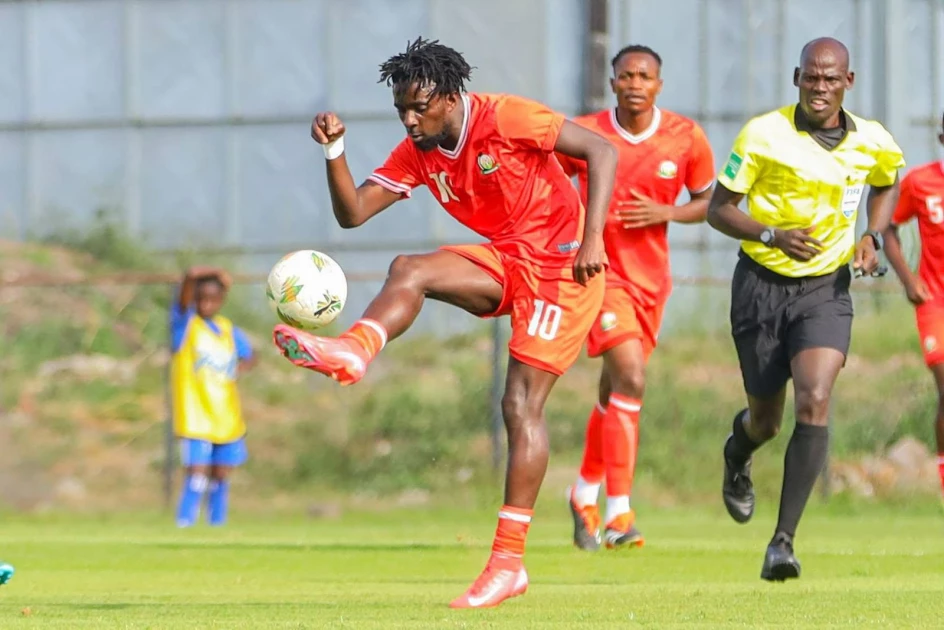OPINION: Why CHAN 2024 is not just a tournament, but a catalyst for East Africa integration

Austin Odhiambo controls the ball during Kenya's CHAN 2024 opening match against DR Congo on August 3, 2025. Kenya won 1-0. Photo by Sportpicha.

Audio By Carbonatix
The eighth edition of the African Nations Championships, otherwise known as CHAN, kicked off over the weekend in the football-mad East Africa region.
Kenya, Uganda and Tanzania are co-hosting this edition, which will also act as a precursor to hosting Africa’s biggest football showpiece, the Africa Cup of Nations (AFCON) in 2027.
The month-long tournament will be held across five stadia in the three East African countries of Kenya, Uganda and Tanzania, with some group matches being played in Zanzibar.
Co-hosting the CHAN tournament by Kenya, Uganda, and Tanzania highlights a major milestone in East African cooperation, showcasing the region’s ability to work together on a continental scale.
This will strengthen EAC integration, boost economic growth through tourism and job creation, as well as accelerate infrastructure development across borders.
The event enhances the global visibility of the three nations, promotes youth empowerment through sports, and fosters a shared regional identity.
Beyond CHAN 2024, this positions East Africa as a united, peaceful, and investment-ready bloc, setting a strong precedent for future joint ventures. This is a moment for the fans to make the tournament memorable and support the bigger picture of EAC integration.
Making a debut at the biennial tournament as co-hosts, Kenya’s Harambee Stars face an uphill task in Group A that has two of the most decorated nations, Morocco and DRC Congo, as well as regulars Zambia and Angola.
Harambee Stars won against DR Congo in their first match on Sunday, 3rd August. Kenya last hosted a tournament of this magnitude over three decades ago when Moi International Sports Centre, Kasarani, welcomed the best of the continent’s athletes for the 1987 All-Africa Games.
A decade later, and despite winning the rights to host the 1996 Africa Nations Cup finals, East Africa’s biggest economy, Kenya, lost the opportunity at the last minute for what the continent’s football governing body termed as ill preparations and awarded the chance to South Africa.
The fun and the thrill of the game are mostly captured in headlines; however, the real work takes place off the pitch.
Hosting major sporting events demands massive financial commitments from governments, not just in securing hosting rights but also in building as well as upgrading infrastructure to meet international standards.
At face value, the costs can seem steep; however, the broader picture tells a different story. The legacy of improved transport networks, modern stadiums, boosted tourism, and countless direct and indirect job opportunities often far outweighs the initial outlay.
It is this long-term socio-economic impact that continues to entice governments into bidding for such prestigious events, not merely for the prestige, but for the transformational impact left behind.
Nairobi is set to host the final match, but before then, the national soccer team Harambee Stars will play their four group A matches at Moi Sports Centre, Kasarani.
Other group matches will be played at Nyayo National Stadium. Both stadia have undergone major facelifts to meet the requisite international standards, a required by the Confederation of African Football (CAF) before hosting rights are granted.
It’s important to note that the Moi International Sports Centre, Kasarani, was built during the 1987 All-Africa Games and was left as the legacy infrastructure.
“Hosting such a major tournament has huge economic, social and infrastructural impact,” says Sports and Youth Affairs Principal Secretary Elijah Mwangi.
He says that 1500 youths will be employed as stewards and volunteers during matches. “They will be deployed inside and outside the stadium and will be assisted by an extra 500 private guards” The PS adds that “these will be direct employment opportunities.”
He estimates that the country will welcome many guests who will be part of national football teams. Indirectly, these players, their technical team and the fans will use our accommodation facilities, and there will be numerous opportunities for the country's thriving tourism and hospitality industries.
On the pitch, our players, all of whom are based locally, will have an opportunity to showcase their talents to a global audience.
Previous editions of this tournament have unearthed world-class talents who later joined big European clubs and made their mark at a global level.
With the tournament coinciding with the Wildebeest Migration at the Maasai Mara, the eighth wonder of the world, it will be a huge opportunity for Kenya to market herself as a global favourite tourist destination.
PS Mwangi says, “The government has put in place plans to ensure that players and guests get an opportunity to tour such destinations as well as our special economic zones in Tatu, Naivasha and Ruaraka. This will be an attempt to woo both local and foreign investments.”
As Harambee Stars attempt to make history on the pitch, the government faces an even harder test to ensure that the tournament runs smoothly.
It’s a delicate balance both on and off the pitch with one eye on the upcoming bigger and better AFCON in two years.
PS Elijah adds, “While the national pride that comes with hosting such huge sporting events overrides economic benefit, the infrastructure legacy left after hosting such events will be used for generations.”
All said and done, the enormous task ahead for the national team on the pitch cannot be overstated. The first match on Sunday, August 3, was against the two-time champions DRC Congo, at Moi International Stadium Kasarani, which Harambee Stars won 1-0.
The Stars will later play the 2011 losing finalists Angola in their second group A match on August 7, and the assignment will be harder when they face the Atlas Lions of Morocco before playing Zambia, arguably the weakest opponents in the group, albeit having reached the semifinal stage once during their five times appearance at the tournament.


Leave a Comment